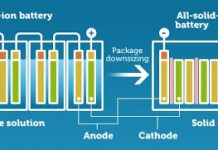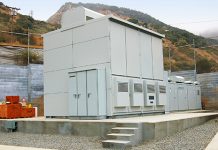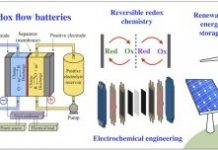John Petersen
Most investors know that Toyota Motors (TM) is the world’s biggest manufacturer of hybrid electric vehicles, or HEVs. Since 1997, Toyota has sold over two million cars using its Hybrid Synergy Drive® and earned a sterling reputation for fuel efficiency and customer satisfaction. What many don’t realize is that Toyota is also the world’s biggest manufacturer of advanced automotive battery packs. Toyota entered the battery business in 1996 when it bought a 40% interest in Panasonic EV Energy, a joint venture company that was formed to make NiMH batteries and battery packs for the Prius. Over time, Toyota gradually increased its stake to 80.5% and Panasonic bought a controlling interest in Sanyo. In June of this year, Panasonic EV Energy changed its name to Primearth EV Energy, presumably to reduce confusion over the fact that Toyota made Panasonic branded batteries while Panasonic made Sanyo branded batteries.
Historically Toyota has been quite conservative about the potential use of lithium-ion batteries in vehicles and has unequivocally stood by NiMH for its HEV lines, primarily because of battery cost concerns. Despite its dominant position in the HEV markets, Toyota has been quietly developing lithium-ion batteries for plug-in hybrid vehicle, or PHV, systems and late last year it launched a three year program to deploy and test a 600 vehicle plug-in fleet in Japan, North America and Europe. Last week a reader sent me a link to Toyota’s ESQ Communications, an easy to navigate, feature-rich and informative website filled with straight talk and balanced information to help consumers and investors separate hype from reality in the battery and plug-in vehicle space. I think the ESQ Communications website is a “must read” for every investor that’s interested in the advanced automotive battery and electric vehicle sectors. It’s short on hype, glittering generalities and promises of an all-electric future, but the depth and accuracy will surprise if not shock some of the more ardent EV advocates that frequently comment on this blog.
The first big surprise is that the Plug-in Prius is a PHV-13, meaning that it has 13 miles of electric drive range as opposed to the 40-mile range of the GM Volt, the 80-mile range of the Nissan Leaf and the 200-mile range of the Tesla Roadster. On the FAQ page for the Prius PHV, Toyota explains the reasons as follows:
“Toyota is of the belief that the smaller the battery in a PHV the better, both from a total lifecycle assessment (carbon footprint) point of view, as well as a cost point of view. Research has shown that plug-in hybrid vehicles with smaller batteries, charged frequently (every 20 miles or less) with average U.S. electricity produce less green house gas emissions than conventional hybrid vehicles. (according to a 2009 Carnegie Melon University study). And as battery size increases, so does the battery cost resulting in higher overall vehicle cost.”
The second big surprise is that with over two million HEVs on the road, Toyota doesn’t believe it knows enough about how PHVs will perform in the hands of ordinary people. So instead of simply launching a product and praying for the best, Toyota plans to conduct a three-year test of clustered fleets in a variety of locations and publish detailed performance data to inform potential customers instead of treating them like lab rats. The FAQ page for the Prius PHV explains the reasons as follows:
“The Prius PHV will come to market in 2012. The PHV demonstration program is designed to gather real world driving data and customer feedback on plug-in hybrid technology. In addition, the program will confirm the overall performance of the first-generation lithium-ion battery technology in a variety of use cases. Toyota must ensure that the vehicle/battery meets customer’s expectations before it is brought to market. The results of this program will make sure that the vehicle coming to market in 2012 will exceed customers’ expectations and meet plug-in customers’ demands.”
The third big surprise is Toyota’s skepticism over claims that the cost of lithium-ion battery packs for vehicles will fall into the $500 per kWh range over the short-term. The FAQ page for the Prius PHV discusses the issue as follows:
“In summer 2009, Toyota was asked to testify in front of a committee at the National Academy of Science in Washington, D.C., on the current state of plug-in technology, which of course included a discussion on advanced batteries. That testimony is a matter of public record and has been reported on in the media.
During that testimony a Toyota representative was asked Toyota’s opinion on current battery costs and how significantly it might be reduced. What Toyota said then was that the very rough estimate was approximately $1200 per KWH for a complete pack including instrumentation and ventilation systems…and that efficiencies in scale alone will not create major cost reductions in the near term. Significant reductions in cost will require major technological breakthroughs.”
There is no question that many electric vehicle advocates will find Toyota’s approach to their dream technology overly conservative. The FAQ page for the Prius PHV describes the reasons for Toyota’s conservative approach as follows:
Toyota believes that PHVs can be part of a solution to climate change and for energy security,
- for certain customers,
- in certain geographic areas,
- with certain grid-mixes,
- with certain drive-cycles,
- and with access to charging.
There will be an important role for PHVs, but it will not be in high volume until there are significant improvements in overall battery performance…and battery cost reduction.
For the last two years I’ve been an unrepentant critic of lithium-ion battery and plug-in vehicle hype that ignores the short-term challenges while focusing on vaguely defined “long-term potential.” It’s more than a little gratifying to learn that the world’s biggest and most experienced carmaker shares my concerns and is taking a rational baby-steps approach to vehicle electrification that focuses on quality, performance and cost, and may very well result in a PHV that works in the real world of paychecks and monthly budget
s, as opposed to the go-for-broke eco-bling approach that GM, Nissan (NSANY.PK), Tesla (TSLA), A123 Systems (AONE) and Ener1 (HEV) are pursuing with government subsidies and stockholders’ money.
This article will no doubt draw outraged comment from advocates who will argue Toyota is simply protecting its turf. I think the more plausible explanation is that Toyota is simply telling the unvarnished truth.
Disclosure: No positions









Maybe, just maybe the idea of us all driving cars in the future is the flawed idea. Yet the state I live in is building new highways like the car is here to stay.
Toyota is correct in how they are approaching the PHV’s.
The Nissan Leaf will be a high priced failure that will probably never make it to market.
Tesla stock has tanked and how could it have had any value in the first place?
If people want a high gas milage car they can buy a Prius. Am I missing something?